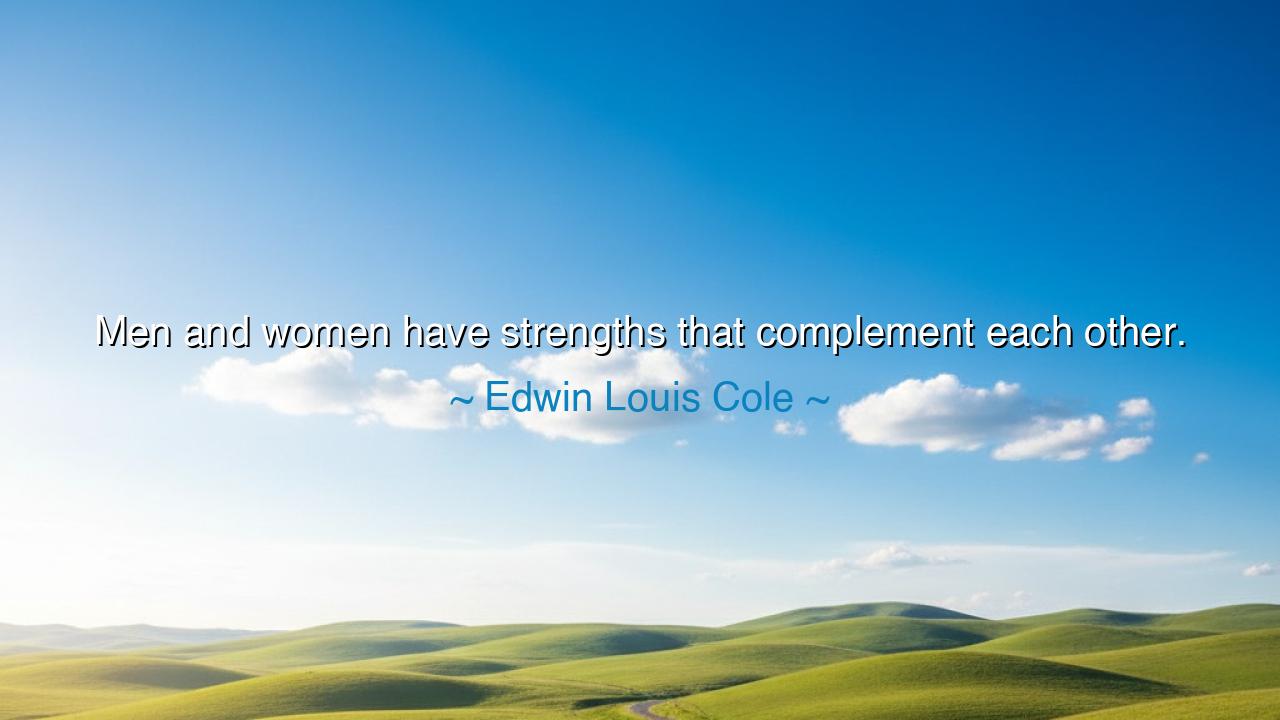
Men and women have strengths that complement each other.






Hear the words of Edwin Louis Cole, who with wisdom declared: “Men and women have strengths that complement each other.” In this saying is revealed the eternal balance of life, the harmony written into creation itself. For neither man nor woman was formed to stand complete in isolation, but together their gifts interweave, each filling what the other lacks, each elevating what the other offers.
The strengths of men and women are not rivals, but allies. One brings endurance, the other brings nurture; one brings vision, the other brings depth; one brings the fire of pursuit, the other the wisdom of preservation. These are not prisons of role, but powers of balance, flowing like sun and moon, earth and sky. Alone, each shines dimly; together, they illuminate the world.
Cole’s teaching is not bound to flesh alone but to spirit and society. For homes, nations, and generations flourish when both complementary strengths are honored. History shows ruin where one voice silences the other, but strength where both are joined. The ancients knew this truth in myth and story, where gods and goddesses stood together, embodying harmony in their union.
This truth is also a charge: to recognize, honor, and cherish what is different, not as threat but as gift. For to despise the strength of the other is to weaken oneself; but to embrace it is to rise higher than either could alone. In this way, man and woman become not adversaries, but companions in destiny, builders of life, carriers of balance.
Thus let the generations remember: the design of creation is complement, not conflict. Strengths that complement each other forge harmony, and harmony forges greatness. Where man and woman walk as one—each strong, each valued, each free—the earth itself is blessed, and the work of life is multiplied with glory.






NTNgoc Ha Nguyen Thi
Edwin Louis Cole's perspective on the complementary strengths of men and women makes sense in theory, but I wonder if it’s time to move beyond gender-specific strengths. In a modern context, could we view these 'strengths' as qualities that any person, regardless of gender, can develop? How can we foster environments where people are encouraged to develop all types of strengths, rather than sticking to gendered expectations?
TPthanh phuong
This quote resonates with me, but I also question whether we still need to categorize strengths in terms of gender. In many relationships, it’s the individual qualities and mutual respect that matter most, rather than adhering to traditional notions of masculinity and femininity. How do we create relationships where each person’s strengths are appreciated without reinforcing outdated stereotypes about what men and women are supposed to be good at?
THPhan Trung Hieu
I agree with the idea that men and women have strengths that can complement each other, but I wonder how much this is influenced by cultural expectations. Are the strengths often attributed to men and women truly innate, or are they products of social conditioning? How do we shift towards a more equitable view, where both genders are seen as capable of excelling in a variety of areas, rather than fitting into predefined roles?
GNtran pham gia nghia
Edwin Louis Cole’s words suggest that men and women have complementary strengths, but is that always the case? In modern relationships, I believe it’s more about understanding and balancing each person’s unique skills and qualities, regardless of gender. Are we limiting ourselves by defining certain strengths as being inherently masculine or feminine? How can we break away from these labels and embrace the diverse talents in each individual, regardless of gender?
PH14- Ha Phi Hieu
This quote makes me think about how men and women are often placed in boxes when it comes to their strengths. Are the traits we associate with each gender really complementary, or do they just reinforce a traditional view of gender roles? How do we ensure that we aren’t creating false expectations of what men and women should be good at, rather than appreciating the diversity of strengths each person brings to the table?